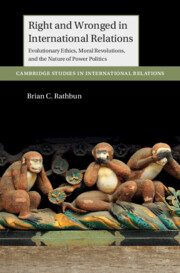 Right and Wronged in International Relations
Right and Wronged in International Relations Book contents
- Right and Wronged in International Relations
- Reviews
- Cambridge Studies in International Relations: 163
- Right and Wronged in International Relations
- Copyright page
- Dedication
- Contents
- Figures
- Tables
- Acknowledgments
- 1 The Nature in and Nature of International Relations
- 2 Lesser Angels
- 3 Mankind Is What Anarchy Makes of It
- 4 See No Evil, Speak No Evil?
- 5 To Provide and to Protect
- 6 Just Desserts in the Desert
- 7 Barking Dogs and Beating Drums
- 8 Biting the Bullet
- 9 Dying in Vain
- 10 Daily Bread
- 11 From Demonizing to Dehumanizing
- Index
- Cambridge Studies in International Relations: 163
2 - Lesser Angels
Moral Condemnation and Binding Morality in International Relations
Published online by Cambridge University Press: 29 July 2023
- Right and Wronged in International Relations
- Reviews
- Cambridge Studies in International Relations: 163
- Right and Wronged in International Relations
- Copyright page
- Dedication
- Contents
- Figures
- Tables
- Acknowledgments
- 1 The Nature in and Nature of International Relations
- 2 Lesser Angels
- 3 Mankind Is What Anarchy Makes of It
- 4 See No Evil, Speak No Evil?
- 5 To Provide and to Protect
- 6 Just Desserts in the Desert
- 7 Barking Dogs and Beating Drums
- 8 Biting the Bullet
- 9 Dying in Vain
- 10 Daily Bread
- 11 From Demonizing to Dehumanizing
- Index
- Cambridge Studies in International Relations: 163
Summary
The focus on cosmopolitan humanitarianism obscures the totality of morality in international politics, leaving the empirical study of morality in IR with two central blindspots. First, it focuses on moral conscience – our desire to do good for others – to the neglect of moral condemnation, our response to the perceived unethical behavior of others, not only against third parties but also against ourselves. In both everyday life and IR, the response is generally to morally condemn, and often to punish and retaliate. Second, the IR ethics and morality literature have not come to terms with moral principles that operate at the group level, binding groups together. When “our” group is engaged in conflict with another, we owe the group our loyalty and defer to group authorities out of moral obligation. These “binding foundations” are particularly important for IR since foreign affairs are a matter of intergroup interaction. Together this means that groups, bound by moral commitment, do not compete with others in an amoral sphere in which ethics stops at the water’s edge. Once we cast our moral net more widely, we realize that morality is everywhere, more striking in the breach than the observance.
Keywords
- Type
- Chapter
- Information
- Right and Wronged in International RelationsEvolutionary Ethics, Moral Revolutions, and the Nature of Power Politics, pp. 31 - 64Publisher: Cambridge University PressPrint publication year: 2023
